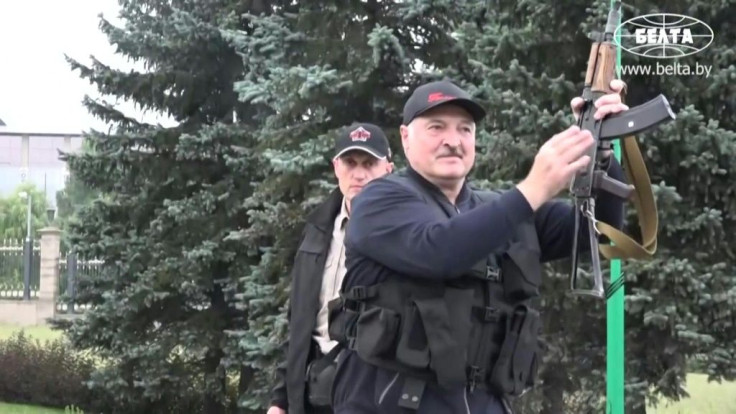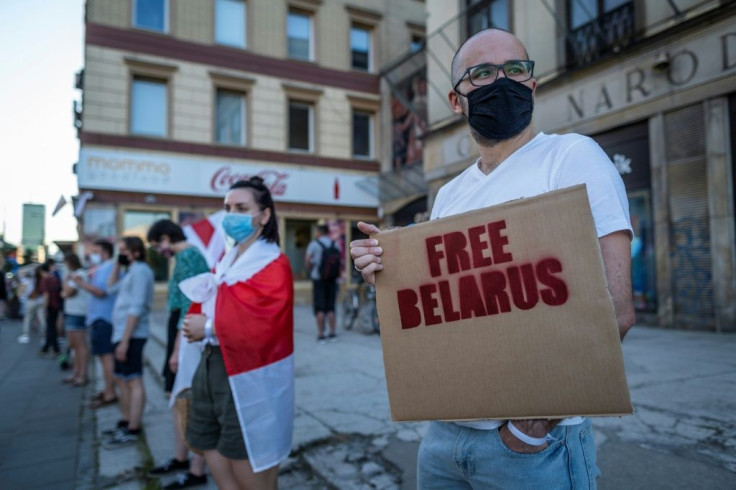'Unprecedented' Belarus Protest Movement Faces Uphill Battle
Protesters in Belarus have shaken President Alexander Lukashenko with a movement unprecedented for the ex-Soviet state in its depth and diversity, but must gird for a long struggle if they are to realise their ambitions.
Analysts say never before have Belarusians from all walks of life -- from hipster teenagers to factory workers -- come together in nationwide protest on such a scale.
The group lacks a clear leader, but is united in its anger over August 9 elections in which Lukashenko claimed over 80 percent of the vote even as the opposition cried foul.
Now comes the hard part, as Belarusians seek to oust Lukashenko after 26 years in power, force fair new elections and a democratic future for the country of 9.5 million wedged between the European Union and Russia.
After initially appearing uncertain, Lukashenko has moved to consolidate his position and has crucially kept the security forces and political elite on his side, with only a handful of high-profile defections.
"In terms of Belarusian history what we have seen has been unprecedented," said Olga Dryndova, expert on Belarus at the University of Bremen, Germany.
"The protest is broadly represented at every social layer," she told AFP, adding people who were never politicised were also backing the movement.

"There never was such large-scale popular mobilisation in the history of Belarus," added Katia Glod, non-resident fellow at the Center for European Policy Analysis, saying it exceeded even the outrage that followed the 1986 Chernobyl disaster in neighbouring Ukraine.
With Lukashenko's election opponent Svetlana Tikhanovskaya in exile in Lithuania, the protesters have mobilised through the popular Telegram messaging app, particularly its Nexta channel run out of Poland by 22-year-old blogger Stepan Putilo.
But they are set to be tested as Lukashenko refuses to budge, with state media showing a clip of him brandishing a rifle and his 15-year-old son Kolya in a flak jacket as opponents mobilised at the weekend.
A key part of the initial pressure were strikes at key industrial facilities. But these are petering out as the authorities threatened to sack strikers and arrested their leader Sergei Dylevsky.
When the governor of the Grodno region began a dialogue with protesters, Lukashenko replaced him with his loyal health minister.

"I think the only one realistic goal (for the protesters) is to perhaps force the authorities to refrain from excessive violence and torture we witnessed" in the aftermath of the election, added Glod.
"But even that is not guaranteed."
Key figures in the protest movement, including Nobel Prize-winning author Svetlana Alexievich, have formed a coordinating council in a bid for a peaceful transition.
But analysts doubt if Lukashenko is open to any dialogue.
Alexievich -- whose book "Second Hand Time" describes how ordinary citizens experienced the fall of the USSR -- has been summoned for questioning by investigators in a criminal probe into an alleged bid to seize power.
"The whole security system, military and interior ministry is still with Lukashenko. This is his last pillar. He has lost the pillar of society," said Dryndova.
Pointing to the image of the gun-wielding president, she said: "Lukashenko is still in power and he has absolute power. A lot depends on his emotional reaction. It is a dangerous moment now."
A giant protest in Minsk at the weekend showed that Lukashenko's opponents can still muster the numbers. Tikhanovskaya told the EU parliament Tuesday a "peaceful revolution" was in progress.
Andrei Kolesnikov, senior fellow at the Carnegie Moscow Center, argued that Belarus civil society "has no intention of going to sleep any time soon".
"His intransigence is a good lesson for dictators in how to retain power in the short term. But it's a bad example in terms of ensuring his personal safety and a peaceful old age in the medium and long term."
Analysts say figures within the ruling elite could press the president to adop a different strategy while the position of giant neighbour Russia was critical. Lukashenko has talked repeatedly to President Vladimir Putin in recent days.
In a piece for Belarusian news website tut.by, prominent Belarusian analyst Artyom Shraibman said sooner or later Lukashenko would have to face reality.
"The moment will come when Lukashenko -- or enough people in his close circle -- realise the risks from dialogue with opponents are fewer than the risks from trying to put the genie back in the bottle."
© Copyright AFP 2024. All rights reserved.





















